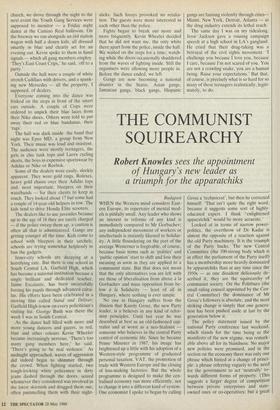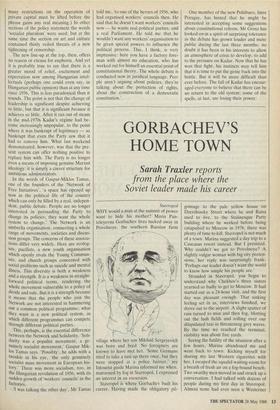THE COMMUNIST SQUIREARCHY
Robert Knowles sees the appointment
of Hungary's new leader as a triumph for the apparatchiks
Budapest WHEN the Western mind considers East- ern Europe, its repertoire of mental mod- els is pitifully small. Any leader who shows an interest in reforms of any kind is immediately compared to Mr Gorbachev; any independent movement of workers or intellectuals is instantly likened to Solidar- ity. A little floundering on the part of the average Westerner is forgivable, of course, because basic terms such as 'politics' and 'public opinion' start to shift and lose their meaning as soon as they are applied to a communist state. But that does not mean that the only alternatives you are left with are those of liberalisation from above a la Gorbachev and mass opposition from be- low a la Solidarity — least of all in Hungary, where nothing is ever simple.
No one in Hungary suffers from the illusion that Karoly Grosz, the new. Party leader, is a believer in any kind of refor- mist principles. Until last year he was described at best as an old-fashioned cen- tralist and at worst as a neo-Stalinist someone who believes in the central Party control of economic life. Since he became Prime Minister in 1987, his image has brightened up a little with his adoption of a Western-style programme of graduated personal taxation, VAT, the promotion of trade with Western Europe and the closing of loss-making factories. But the whole programme is designed to make the cen- iralised economy run more efficiently, not to change it into a different kind of system. One economist I spoke to began by calling Grosz a 'technocrat', but then he corrected himself: 'That isn't quite the right word, because it suggests some sort of highly- educated expert. I think "enlightened apparatchik" would be more accurate.'
Looked at in terms of narrow power- politics, the overthrow of Dr Kadar is almost the opposite of a reaction against the old Party machinery. It is the triumph of the Party hacks. The new Central Committee (the 100-strong body which is in effect the parliament of the Party itself) has a membership more heavily dominated by apparatchiks than at any time since the 1950s — as one dissident deliciously de- scribed it, they are the squirearchy of communist society. On the Politburo (the small ruling council appointed by the Cen- tral Committee) the dominance of Mr Grosz's followers is absolute, and the most striking change is simply that one genera- tion has been pushed aside at last by the generation below it.
The policy statement issued by the national Party conference last weekend, which stands for the time being as the manifesto of the new regime, was remark- able above all for its blandness. No major new policies were promised, and in the section on the economy there was only one phrase which hinted at a change of princi- ple: a phrase referring vaguely to the need for the government to act 'neutrally' to- wards different forms of property. (This suggests a larger degree of competition between private enterprises and state- owned ones or co-operatives; but a great
many restrictions on the operation of private capital must be lifted before the phrase gains any real meaning.) In • other sections of the policy statement the words 'socialist pluralism' were used; but at the same time the section on art and culture contained thinly veiled threats of a new tightening of censorship.
The new line-up at the top, then, offers no reason or excuse for euphoria. And yet it is probably true to say that there is a greater mood of relief, excitement and expectation now among Hungarian intel- lectuals (perhaps one could even say, in Hungarian public opinion) than at any time since 1956. This is, less paradoxical than it sounds. The point is not that the change of leadership is significant despite achieving so little, but that it is significant because it achieves so little. After it ran out of steam in the mid-1970s Kadar's regime had be- come increasingly unpopular, to the point where it was bankrupt of legitimacy -- so bankrupt that even the Party saw that it had to remove him. What last weekend demonstrated, however, was that the pre- sent system can offer nothing positive to replace him with. The Party is no longer even a means of imposing genuine Marxist ideology: it is simply a career structure for ambitious administrators.
In the words of Gaspar-Miklos Tamas, one of the founders of the 'Network of Free Initiatives', 'a space has opened up now in the political life of the country which can only be filled by a real, indepen- dent, public debate. People are no longer interested in persuading the Party to change its policies; they want the whole system to change.' The Network is an umbrella organisation, connecting a whole range of movements, societies and discus- sion groups. The concerns of these associa- tions differ very widely. Here are ecolog- ists, pacifists, a new youth organisation which openly rivals the Young Commun- ists, and church groups concerned with social problems such as suicide'and mental illness. This diversity is both a weakness and a strength. It is a weakness in straight- forward political terms, rendering the whole movement vulnerable to a policy of divide and rule. But it is a strength because it means that the people who join the Network are not interested in hammering out a common political programme; what they want is a new political system, in which different programmes can compete through different political parties.
This, perhaps, is the essential difference between the Network and Solidarity. 'Soli- darity was a populist movement, a ge- nuinely socialist movement,' Gaspar Mik- los Tamas says. 'Possibly', he adds with a twinkle in his eye, 'the only genuinely socialist mass movement in European his- tory.' There was more socialism, too, in the Hungarian revolution of 1956, with its sudden growth of 'workers' councils' in the factories.
'I was talking the other day', Mr Tamas told me, 'to one of the heroes of 1956, who had organised workers' councils then. He said that he doesn't want workers' councils now — he wants real political parties, and a real Parliament. He told me that he wouldn't want any workers' organisation to be given special powers to influence the political process. This, I think, is very impressive: here you have a factory fore- man with almost no education, who has worked out for himself an essential point of constitutional theory. The whole debate is conducted now in juridical language. Peo- ple aren't arguing about policies, they're talking about the protection of rights, about the construction of a democratic constitution.' One member of the new Politburo, Imre Pozsgay, has hinted that he might be interested in accepting some suggestions about constitutional reform. Mr Grosz has looked on in a spirit of surprising tolerance as the debate has grown louder and more public during the last three months; no doubt it has been in his interests to allow an atmosphere of crisis to develop, to add to the pressure on Kadar. Now that he has won that fight, his instincts may tell him that it is time to put the genie hack into the bottle. But it will be more difficult than ever before. The fall of Kadar has encour- aged everyone to believe that there can be no return to the old system; some of the spells, at last, are losing their power.



















































 Previous page
Previous page